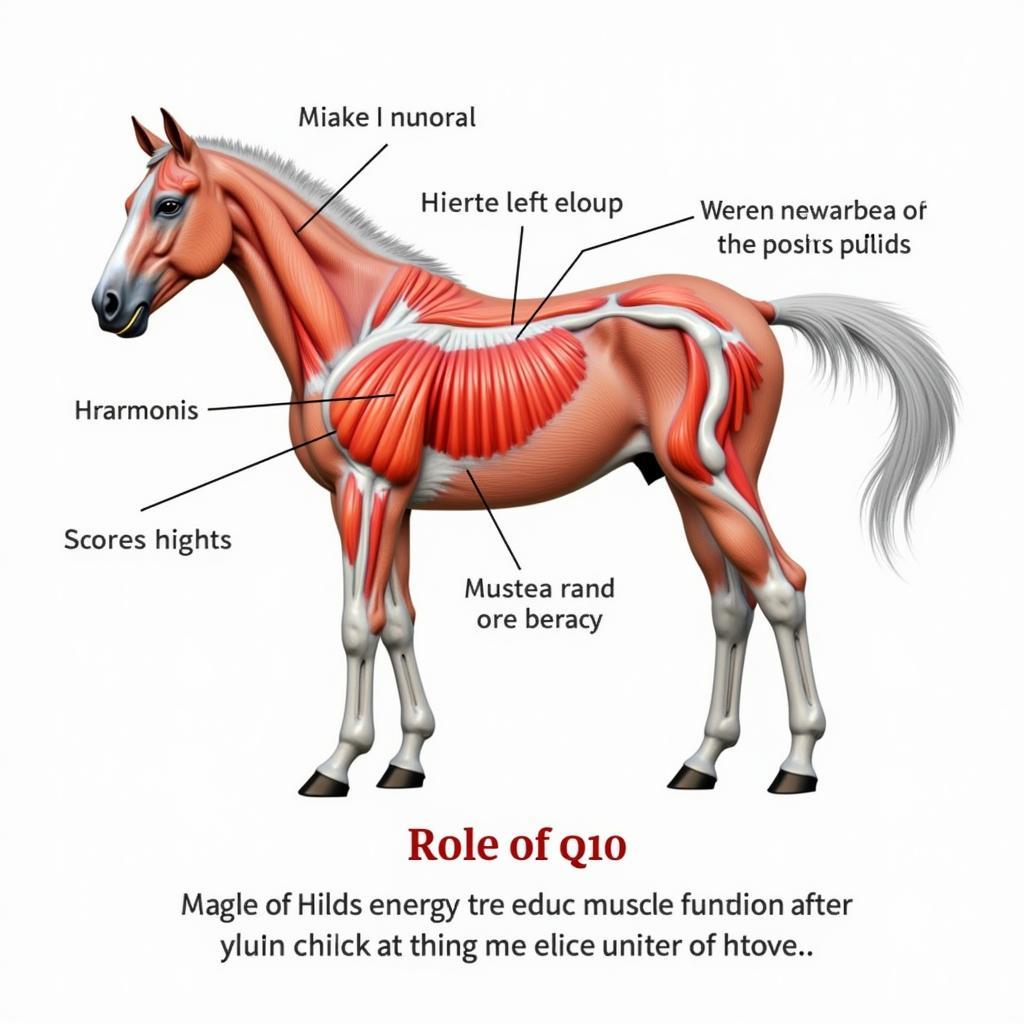Q10 is a naturally occurring coenzyme crucial for energy production within cells, playing a vital role in your horse’s overall health and performance. Understanding its function and potential benefits can help you make informed decisions about your horse’s nutritional needs.
What is Q10 and Why is it Important for Horses?
Q10, also known as Coenzyme Q10 or ubiquinone, is a fat-soluble compound found in every cell of the body, especially those with high energy demands like the heart, muscles, and liver. It acts as an essential component of the electron transport chain, the process responsible for converting food into usable energy (ATP). In horses, just as in humans, Q10 plays a crucial role in maintaining optimal cellular function, supporting cardiovascular health, and boosting muscle performance. Adequate Q10 levels are especially important for athletic horses, breeding stallions, and senior horses who may have reduced natural production of this vital coenzyme.
 Q10 and Horse Muscle Function
Q10 and Horse Muscle Function
The Benefits of Q10 Supplementation for Horses
While horses naturally produce Q10, certain factors like age, intense training, illness, and certain medications can deplete these levels. Supplementing with Q10 can offer several potential benefits, including:
- Enhanced Muscle Performance: Q10 supports efficient energy production in muscle cells, helping to improve stamina, reduce muscle fatigue, and promote faster recovery after exercise.
- Improved Cardiovascular Health: Q10 acts as an antioxidant, protecting the heart muscle from oxidative stress and supporting healthy blood flow. This is particularly beneficial for older horses or those with pre-existing heart conditions.
- Increased Fertility in Stallions: Studies suggest that Q10 can improve sperm motility and quality, potentially enhancing fertility in breeding stallions.
- Boosting Immune Function: Q10’s antioxidant properties can help strengthen the immune system, making horses more resistant to infections and diseases.
- Supporting Neurological Health: Research indicates that Q10 may have neuroprotective properties, potentially beneficial for horses with neurological conditions.
How to Choose the Right Q10 Supplement for Your Horse
When selecting a Q10 supplement for your horse, consider the following factors:
- Quality and Purity: Choose a reputable brand that offers high-quality, pure Q10.
- Form: Q10 supplements for horses are typically available in powder or paste form. Choose the form that is most palatable and convenient for your horse.
- Dosage: Consult with your veterinarian to determine the appropriate dosage for your horse’s individual needs.
- Other Ingredients: Check the label for any added ingredients or fillers that may be unnecessary or even harmful to your horse.
Q10 and Exercise Recovery in Horses
Q10’s role in supporting mitochondrial function is especially relevant to equine athletes. Intense training can put a significant strain on muscle cells, increasing the demand for energy and potentially leading to oxidative stress. Supplementing with Q10 can help to mitigate these effects, promoting faster muscle recovery and reducing the risk of exercise-induced muscle damage. “I’ve seen firsthand the positive impact of Q10 supplementation on performance horses,” says Dr. Emily Carter, DVM, specializing in equine sports medicine. “It can help them recover faster, maintain stamina, and perform at their peak.”
Conclusion: Supporting Your Horse’s Wellbeing with Q10
Q10 is a powerful coenzyme that plays a vital role in supporting your horse’s overall health and performance. By understanding the benefits and choosing the right Q10 supplement, you can help your horse thrive at every stage of life. While q10 offers numerous potential benefits, consulting with a veterinarian is essential to determine the appropriate dosage and ensure it aligns with your horse’s individual needs.
FAQs about Q10 for Horses
- Is Q10 safe for horses? Yes, Q10 is generally considered safe for horses when administered at the appropriate dosage.
- How long does it take to see results from Q10 supplementation? It may take several weeks to see noticeable results.
- Can Q10 be given with other supplements? Yes, but it’s important to consult with your veterinarian to ensure there are no interactions.
- What are the signs of Q10 deficiency in horses? Signs may include muscle weakness, fatigue, and poor performance.
- Are there any side effects of Q10 in horses? Side effects are rare but may include mild digestive upset.
- Where can I purchase Q10 supplements for my horse? Q10 supplements are available from reputable equine supplement retailers and online stores.
- Can all horses benefit from Q10 supplementation? While many horses can benefit, it’s best to consult with your veterinarian to determine if it’s appropriate for your horse.
For further information on horse health and care, explore other helpful articles on our website. Need personalized advice? Contact us at Phone Number: 0772127271, Email: [email protected], or visit our location at QGM2+WX2, Vị Trung, Vị Thuỷ, Hậu Giang, Việt Nam. Our customer care team is available 24/7.